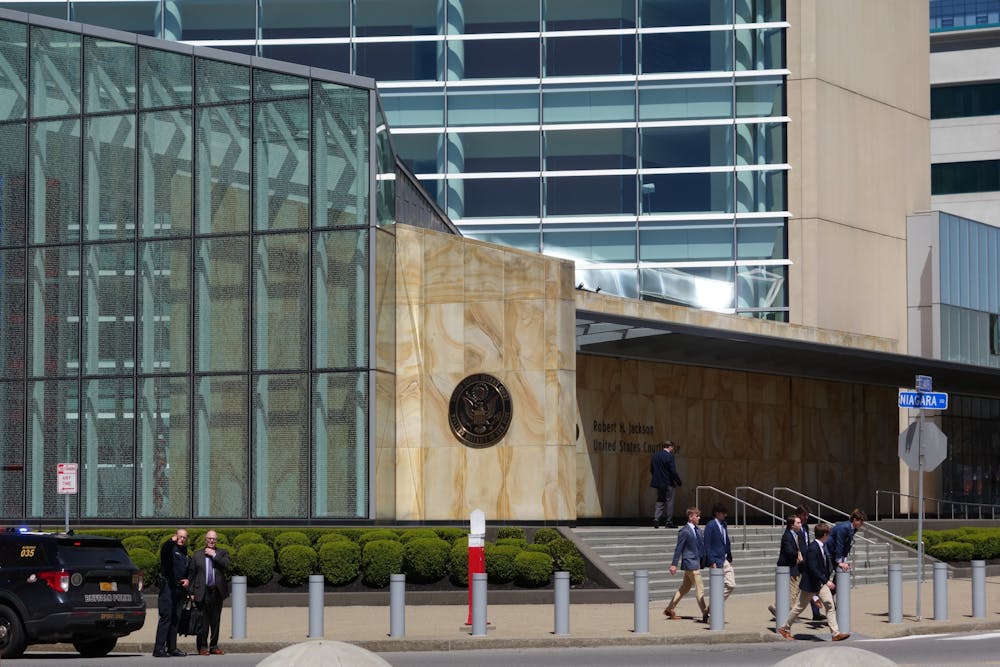A federal judge appeared skeptical of a right-wing UB student group’s claim that a Student Association (SA) policy targeted it with a “constitutional injury” by prohibiting the club from becoming its own legal entity.
In a hearing Friday — the first in a lawsuit originally filed in June 2023 — lawyers representing the Young Americans for Freedom (YAF), SA and several UB officials largely echoed points they have made in months of court filings: YAF lawyers lobbied for a temporary injunction against the SA’s club recognition policy, while UB and SA lawyers sought to have the case dismissed.
Aaron Saykin, representing SA, said in court Friday that YAF has never suffered a concrete injury from SA’s policies, and that YAF rebuffed SA attorneys’ offers to compromise.
“This is about as vanilla as it gets,” Saykin said. “I challenge anyone to identify a contract SA has not approved for the plaintiff.”
Meanwhile, YAF attorney Logan Spena, who joined the case this month, argued that SA’s contract policies grant it “unbridled discretion,” violating the student government’s requirement to maintain viewpoint neutrality in its funding decisions. He says SA’s by-laws aren’t enough to prevent viewpoint discrimination, and that SA’s affiliation ban — which the student government says never took effect — caused YAF to suffer “constitutional harm.”
Federal District Judge Lawrence Vilardo appeared skeptical of that notion. He said that if SA had taken any concrete action against YAF, the organization would have a claim.
“I’m having a hard time with this ‘constitutional injury’ that seems to be something of your own creation,” Vilardo told Spena.
In a telephone interview with The Spectrum after the hearing ended Friday afternoon, Spena said SA’s club funding structure is both unusual and unconstitutional. He says that by requiring clubs to operate within SA, the student government forces them to associate with views they disagree with.
“They’re saying, ‘You’ve got no legal existence whatsoever,’ so the only group that exists is the Student Association,” Spena said. “The Student Association is basically conscripting everybody to be in one giant group.”
In a telephone interview after the hearing, Saykin disagreed.
“The process that’s in place now is compliant with every constitutional requirement,” he said. “It helps ensure that the student funds are properly protected, and administered and spent in a way consistent with the purposes of the student government.”
Vilardo offered no timeline for a decision.
What led up to YAF’s day in court? One campus visit by a conservative speaker, two SA policies and 11 months of court filings
The case is rooted in an SA policy introduced in March 2023 that would’ve forced most clubs to cut ties with third-party organizations. That policy came around three weeks after a YAF-sponsored speech on campus by right-wing commentator Michael Knowles drew hundreds of protesters.
At the SA Senate meeting where the policy passed, SA President Becky Paul-Odionhin said the policy would “protect SA” from conflicts with the missions of outside organizations. While SA leaders never publicly named YAF or the Knowles speech, Paul-Odionhin told senators, “We all know why we’re doing this.”
The move sparked a backlash from affected clubs. On June 1, 2023, YAF sued SA and three UB officials, alleging that SA intended to silence YAF and that the UB officials should have stopped SA’s policy.
SA denies its policy targeted YAF.
A month after YAF sued, SA repealed the affiliation ban and replaced it with a new “Acknowledgement of Club Officer Responsibilities” policy. That document requires club officers to agree to certain pre-existing requirements before taking office, including that “no SA club may be a separate legal entity from SA.”
YAF refused to sign the document, instead amending its lawsuit to claim that that prohibition on clubs’ holding a separate legal status unconstitutionally required YAF’s officers to associate themselves with groups they disagree with.
A filing at the time names College Democrats, UB’s LGBTA, Students for Justice in Palestine, Women’s Healthcare and Wellness Association and IGNITE as clubs YAF leaders feel they are forced to associate with by being part of SA.
Though YAF attorney Travis Barham said last month that YAF’s lawsuit represents all clubs, he said none have offered their support.
“All student groups that are subject to these policies are being harmed,” Barham said in a telephone interview. “Whether they want to stand up and try to vindicate their rights is a different matter; whether they want to let Young Americans for Freedom lead the charge on that and then reap the benefits of what we hope will be a victory is a different matter.”
Mylien Lai contributed to the reporting of this article.
Sol Hauser is the senior news editor and can be reached at sol.hauser@ubspectrum.com





